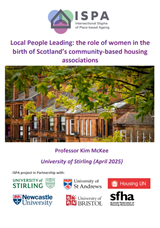Local people Leading: the role of women in the birth of Scotland’s community-based housing associations

A new report, led by Professor Kim McKee of the University of Stirling, highlights the often-overlooked role women played in shaping Scotland’s community-based housing association (CBHA) sector in the 1970s and 80s.
These women were not just contributors - they were leaders, driving change in their neighbourhoods during this period. The report highlights how their leadership and activism laid the foundations for a model of community ownership in Scotland that remains unique and powerful today. It also explores the gendered barriers they faced, the achievements of CBHAs over five decades, and the challenges they face now and into the future.
The report concludes with five key recommendations:
- the social housing sector should celebrate Scotland’s distinct CBHA model and learn from its experience and its emphasis on local, place-based knowledge.
- the Scottish Government and local authorities should continue to invest in CBHAs to enable them to deliver more affordable homes and their pivotal wider role activities – recognising the social and economic value of their contribution as community-anchors.
- the need for CBHAs (and their education and training partners) to augment existing resources to develop a bespoke training offer for new CBHA committee members/staff.
- the potential for partnership working across the housing association sector to promote the benefits of volunteering in housing. This would support succession planning and board recruitment and could be targeted towards under-represented groups.
- for policy development on culture and leadership (led by the Scottish Housing Regulator and the Scottish Government) to recognise the diversity of the social housing sector in Scotland and that a ‘one size fits all solution’ is unhelpful.
Professor McKee said:
“Above all else, this report emphasises the need to learn lessons from the past. Fifty years ago, women were pivotal to the creation of CBHAs. Action needs to be taken to ensure that today’s women can continue to make such a contribution and CBHAs can continue to thrive. They are strong examples of organisations which, in their dual roles as social landlords and community anchors, have transformed poor housing conditions and tackled place-based stigma in some of Scotland’s poorest communities.”
“The Grenfell Tower disaster shows what can happen when social landlords become too detached, dismissive and forget the people that they serve. CBHAs are an antidote to this kind of remote, paternalistic service delivery. Rooted in working-class communities, their strength is their neighbourhood focus, place-based knowledge and tenant-centred approach. They are a real testament to what people power can achieve.”
The report, ‘Local people Leading: the role of women in the birth of Scotland’s community-based housing associations’ is the first case-study from the Intersectional Stigma of Place-based Ageing project and its package of work focused on organisations in housing, health and social care. Led by Professor Vikki McCall of the University of Stirling, this is a collaborative project funded by the Economic and Social Research Council (grant award number: ES/W012677/1 XYZ) that includes several academic and non-academic partners and involves the co-production of research with organisations from the sector.
Professor McCall from the University of Stirling noted:
“This report is a powerful reminder that women have always been central to positive change in our communities. Their leadership within community-based housing associations hasn’t just improved homes — it’s tackled deep-rooted stigma and reshaped how people feel about where they live”.
Glasgow and West of Scotland Forum of Housing Associations were the collaborative partner on this project. Director of GWSF, David Bookbinder added:
“This is a hugely welcome and important piece of research. Whilst it focuses on what happened 30-50 years ago, we’ll be considering how these powerful stories can help inform the way in which community-based associations continue to thrive long into the future.”
The report’s findings will be spotlighted at a 50th birthday event for CBHAs being hosted in Glasgow by GWSF on the 29th April, and then in more detail at other project dissemination events following in June.
